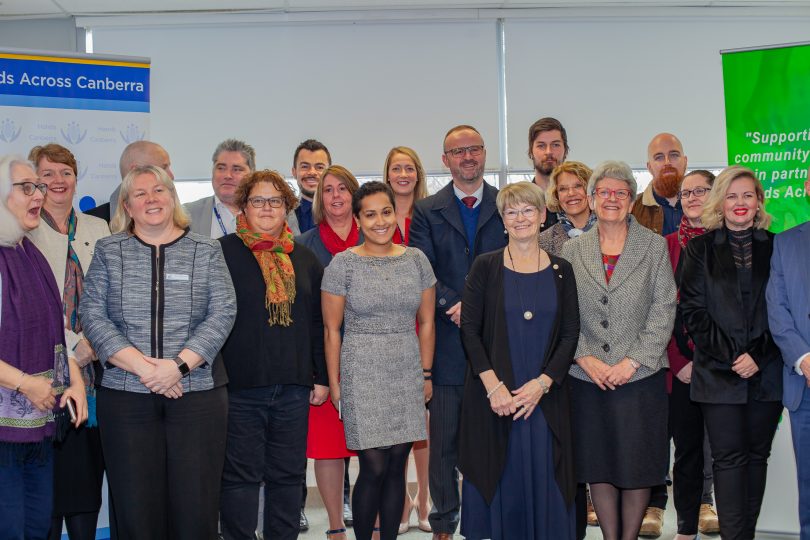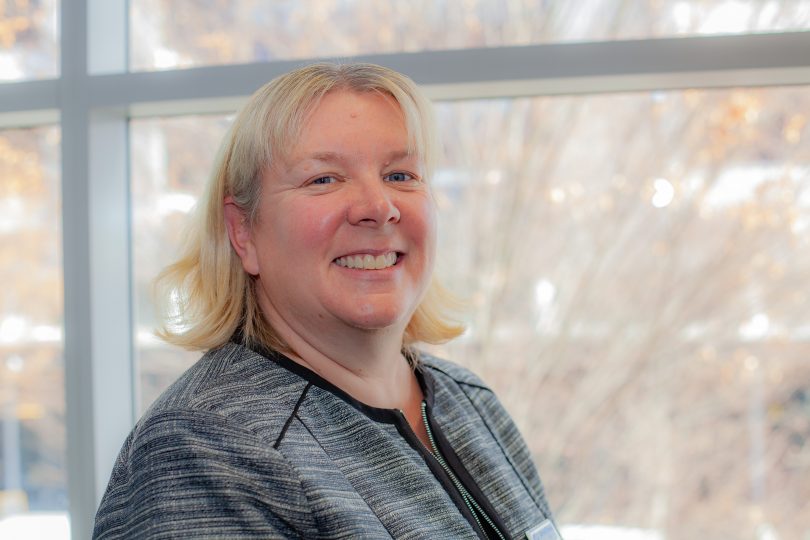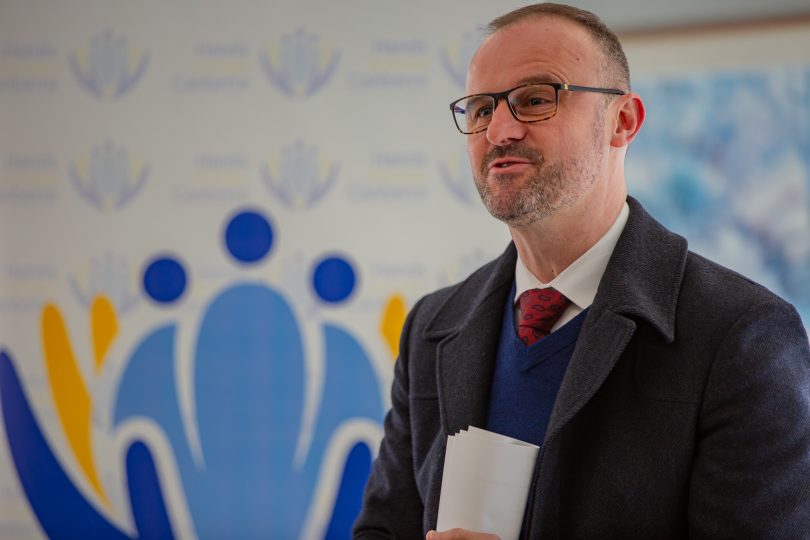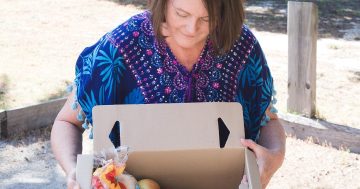
The first Chief Minister’s Charitable Fund grant recipients with Andrew Barr and Diana Kargas Bray (in front of Mr Barr) at the Hands Across Canberra announcement on Wednesday. Photos: George Tsotsos.
A pilot program to get homeless men and women off the streets and into permanent housing is one of 29 grant recipients from the first funding round of the Chief Minister’s Charitable Fund.
Announced today by fund administrator Hands Across Canberra, the grants total nearly $400,000, distributed among a diverse range of community groups. Noting the quality of the applications, it said a further eight grants had been made as a result of reaching out to philanthropic partners.
One of the most significant grants is $20,000 towards CatholicCare’s pilot program that includes operating an 18-bed facility to provide free overnight and short-term accommodation to homeless men and women coupled with support and referral services, something that all-churches initiative Safe Shelter, which provides a walk-in crisis accommodation for men across three Inner North church halls, has been calling for.
CatholicCare Canberra and Goulburn CEO Anne Kirwan said the organisation, together with St Vincent de Paul, had been trying for some time to find answers to the ongoing pressures in its homelessness services.
“What we’re looking to do is trial a pilot which provides overnight accommodation, a safe place for people to stay, but in addition brings the wrap-around support services from the entire homelessness sector to provide support for people to create pathways out of homelessness,” she said.
The organisation didn’t just want to provide one-off support but the ‘advocacy, referral, case management support to people to assist them to navigate the very complex systems around housing and accommodation in the ACT’.
Central to this is a partnership with Housing ACT, which would provide an existing, unused building where homeless men and women could find overnight shelter but importantly be able to access outreach services in the morning.
Ms Kirwan said CatholicCare had suggested a number of locations but with negotiations with all stakeholders continuing she could only say it would be ‘somewhere very central’.

CatholicCare Canberra and Goulburn CEO Anne Kirwan: more than just one-off support.
The building would have overnight supervision, individual rooms and shower, toilet, laundry and kitchenette facilities. “The goal is that at 7 am the outreach services come in and start actively working with people around their long-term housing and what their options are and getting them back into the system,” Ms Kirwan said.
“I did the Vinnies CEO sleepout two weeks ago and one of things they [homeless people] really drove home was how you go to one service and then you have to go to another service, and another service, and in the end they just give up. What we are trying to do is bring services to them, or actually take people to services to stop that breakdown in the referral process.”
Ms Kirwan said she anticipates the six to 12-month pilot could be up and running in a couple of months.
Although it was hard to know just how many homeless men and women there are in the ACT, Ms Kirwan said one just needed to walk around the centre of Canberra to see more people sleeping on cardboard and in doorways than the sector had ever seen before.
“Part of that is around the sophistication needed to navigate the sector to be able to get off the street, and for some people who experience particular barriers, perhaps drug and alcohol issues, debt issues, they really need advocacy support to help them to get through that into the system,” she said.
CatholicCare wanted to demonstrate that the model proposed would help people get off the streets long term.
As well as working with its Government and community sector partners, the organisation would also be looking to the business sector for contributions. “We’ll be tapping on lots of doors because what we really want is ongoing support to make this work,” Ms Kirwan said.
Chief Minister Andrew Barr denied that the Government had had a change of heart when it came to crisis accommodation, saying the move reflected a holistic response across the board to housing challenges.
“It’s not as if it’s a unique challenge here in Canberra,” he said. “It’s considerably worse everywhere else in Australia, we’ve actually had quite significant improvements in the ACT between the 2011 and 2016 census, and we’re the only state or territory that’s actually increasing its provision of public housing. So we’re doing a lot, but there will always be more to do.”
He said there was an increasing need for governments and the broader community to work together to address rough sleeping as well as homelessness, ‘noting the distinction between those who don’t have immediate crisis or other accommodation who are sleeping rough with those who experience from time to time homelessness at the end of lease, change in family circumstances or the like’.
“Here is another practical example of where we are doing more and leveraging funds and support from a variety of different sources to make a difference,” Mr Barr said.

Chief Minister Andrew Barr hopes the fund will make an ongoing and expanding contribution to the ACT community.
The Chief Minister said the fund and its grants, which had had its critics and naysayers, was an important whole-of-community effort to respond to pressing areas of need, with a focus on mental health and wellbeing, inclusion and homelessness.
“We now have a mechanism to grow that support year on year,” he said.
Other recipients include $4900 to Parentline ACT’s outreach program to parents and carers from Culturally and Linguistically Diverse backgrounds, particularly those parents who are isolated or newly arrived refugees, connecting them with community facilities and ensuring that children have an opportunity to fully participate in the Canberra community.
Uniting Care Kippax received $35,000 to help build its Ginninderry Social Enterprise Hub, to provide workplace accommodation, training and storage facilities for up to three separate social enterprises.
Canberra PCYC’s Youth Engagement Program received $25,000 to help it engage young people to reconnect with education and training and to adopt safe life skills.
The Chief Minister’s Charitable Fund was established in 2018 with a $5 million grant from the ACT Government invested as seed funding, to kick-start a long-term commitment to local charities and the community sector.
The projects – including e-learning platforms, mobile outreach services, innovative approaches to transitional housing, food rescue, work skills programs, retrofits and workshops – will all be delivered over the coming 12 months.
Hands Across Canberra Chair Diane Kargas Bray said the organisation was committed to ensuring the Chief Minister’s Charitable Fund was a true collaboration between the community, business and government.
“The community sector is an incredibly important part of how our city functions,” she said. “Each year we consult widely about the need that exists and how we might work with the community sector to address real issues such as homelessness, disability, access to employment for trans and sexually diverse people and domestic and family violence.”
Hands Across Canberra is an independent philanthropic community foundation, working with more than 300 local community organisations. In addition to the ACT Government’s seed funding, Hands Across Canberra has sought collaborations with the Snow Foundation, the John James Foundation and the Office for Aboriginal and Torres Strait Islander Affairs to support the Chief Minister’s Charitable Fund.
Beyond financial contributions, Givit and Master Builders ACT are further providing in-kind support to a number of grant applicants.





















